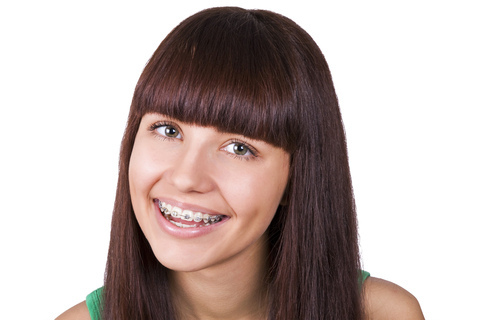December 21st, 2022

While braces play an important part in helping to create a healthy mouth and teeth, you might experience a few side effects while wearing them that are common and can be easily treated.
Even with the best of care, braces can cause soreness to your mouth. As your teeth begin to move, it is natural for your teeth to feel aches and your jaw to develop soreness.
If there are broken wires or loose bands on your braces, a sore tongue, mouth, or canker sore will occur. Canker sores are a common occurrence when braces rub inside the mouth. There are ointments available to reduce the pain and irritation associated with mouth sores. We urge those who experience a sore mouth or any of the following problems to call our office to schedule an appointment.
- Loose brackets: Apply a small amount of orthodontic wax to the bracket temporarily. You might also apply a little between the braces and the soft tissue of your mouth.
- Loose bands: These must be secured in place by your orthodontist. Try to save the band for repair.
- Protruding or broken wires: The eraser end of a pencil can be used to move the wire carefully to a less painful spot. If you are unable to move it, apply orthodontic wax to the tip. If a mouth sore develops, rinse with warm salt water or antiseptic rinse.
- Loose spacers: These will need to be repositioned and sometimes replaced.
Foods to Avoid
Some foods can also help or hurt you while you’re wearing braces. Remember to cut your food into small pieces that can be easily chewed. You will want to avoid hard and chewy foods that can break your hardware. Foods such as corn on the cob, nuts, carrots, apples, ice, and bubble gum should be avoided.
Braces, rubber bands, springs, and other mouth appliances associated with braces will normally attract food particles and plaque. Without the proper care, this could cause staining of your teeth.
Our staff at Knowlton Family Orthodontics, recommends brushing after every meal or snack and carefully removing any food that might be lodged in the braces. A fluoride mouthwash might be helpful as well as flossing. At your next appointment, Dr. Clark Knowlton can advise you how to floss with a brush specially designed for braces!
December 14th, 2022

When beginning orthodontic treatment, most patients ask Dr. Clark Knowlton and our team a lot of questions about what to expect, while others choose to just "go with the flow" and leave it to us to build for them a beautiful smile. And for our team at Knowlton Family Orthodontics,, that's understandable.
But for those who do ask questions, two of the ones we frequently hear are "Will my braces hurt?" and "How long will these be on?"
We explain to our patients that despite what they've heard, braces do not hurt when they're initially put on. Yes, you will experience soreness after your braces are placed and when your teeth start to move. Too often, our patients hear horror stories about how much it hurts to get the braces on, so they tend to over-worry. The truth is, after their braces are on, almost all patients say "that's it?" because it's actually easy and painless!
At Knowlton Family Orthodontics,, we answer most of your other questions during your initial exam. When a patient visits our office for the first time, we give him or her a time estimate of how long it will take to achieve their ideal smile. All other questions are answered at the bonding appointment when the braces are placed. We cover all the topics, everything from eating to brushing with braces, but we also know that after your initial appointment, it's natural for you to have questions about your or your child's treatment. And we are always here for you; we are thorough and always try to answer any questions or concerns you may have. As a patient, that's one thing you never have to worry about. You will always know what's going on throughout your orthodontic experience.
December 7th, 2022

If this is your first winter with braces, you might be wondering how to make the best of the holiday season. Dr. Clark Knowlton and our team have some suggestions for happy and healthy holiday smiles.
Treat Yourself
Winter means tasty holiday treats, and just because you wear braces doesn’t mean you need to step away from the holiday table! You can enjoy your favorites if you remember to check your list for the usual problem foods. Hard, crunchy, chewy, and sticky items? Naughty list.
- Crunchy vegetables on the appetizer plate
- Nuts
- Hard rolls
- Candy canes and other hard sugar treats
- Caramels, Toffee and other sticky candies
- Pecan pie
- Fruit cake
Luckily, there are plenty of nice alternatives.
- Turkey and ham—remember, small pieces are best
- Dressing and stuffing
- Mashed potatoes
- Soft breads and rolls
- Pumpkin pie—but skip a tough crust!
- Cheesecake
- Soft cookies and cakes
- Soft chocolates
We’re happy to provide recommendations for braces-friendly holiday foods. And we don’t expect you to turn down every sweet treat this season. Just be sure that if you enjoy something sugary, brush carefully after indulging.
Express Yourself
While you’re decking the halls, or pinning up the New Year’s balloons and streamers, or even choosing a great holiday outfit, don't forget that your ligatures can be decorative as well as functional.
- Celebrating Christmas? Red and green bands around your brackets are jolly and traditional.
- How about Hanukkah? Try blue and white!
- Love the season? Icy silvers and pale blues are a frosty statement—and can have the benefit of making your teeth look whiter, as well. Snowy white? The arctic idea is great, but white bands can sometimes make teeth look more yellow, or become stained themselves.
- Glam New Year? Gold adds sparkle to your smile, but can bring out any yellow tones in your teeth. Silver might be the perfect choice, because it is generally neutral with enamel shades.
Check out our ligature colors for the best possible choices for your teeth and coloring. Take advantage of these options to create a fresh, confident look for the season. Give others the gift of your smile!
Look After Yourself
Winter comes with some special reminders about your dental health.
- Winter sports are a great way to celebrate the snow and ice, but be sure to protect your teeth and braces. If you enjoy skiing, snowboarding, ice skating, hockey, or any other winter activities, talk to us about why a mouth guard is so important.
- While you enjoy your winter break, don’t forget to keep up with your dental routine. And because ‘tis the season for holiday treats, be especially careful to clean your teeth and braces after sweet desserts and snacks. Don’t forget to floss!
- What do cold breezes and hot chocolate have in common? They can both trigger tooth sensitivity! While some sensitivity is normal after an adjustment, if you find you are experiencing tooth sensitivity more often or more strongly than you usually do, give us a call. It might be something as simple as brushing habits, or you might need to see your dentist.
If you have any questions about your braces, in this season or any other, just ask when you visit our Sherman office. Your beautiful, healthy, and confident smile can make this the most wonderful time of the year!
November 30th, 2022

Parents usually have numerous questions about orthodontic treatment for their children. According to the American Association of Orthodontists, orthodontic treatment for children should start at around seven years of age. This allows Dr. Clark Knowlton to evaluate the child’s existing and incoming teeth to determine whether or not early treatment might be necessary.
What is early orthodontic treatment?
Early orthodontic treatment, known as Phase One, usually begins when the child is eight or nine years old. The goal is to correct bite problems such as an underbite as well as guide the jaw’s growth pattern. It also helps to make room in the mouth for the permanent teeth to be properly placed as they come in. This will greatly reduce the risk of the child needing extractions later in life due to his or her teeth getting crowded.
Does your child need early orthodontic treatment?
There are several ways that you can determine whether your child needs early treatment. If you observe any of these characteristics or behaviors, you should talk to Dr. Clark Knowlton.
- Early loss of baby teeth (before age five)
- Late loss of baby teeth (after age five or six)
- The child’s teeth do not meet properly or at all
- The child is a mouth breather
- Front teeth are crowded (you won’t see this until the child is about seven or eight)
- Protruding teeth, typically in the front
- Biting or chewing difficulties
- A speech impediment
- The child’s jaw shifts when he or she opens or closes the mouth
- The child is older than five years and still sucks a thumb
What are the benefits of seeking orthodontic treatment early?
Early orthodontic treatment is begun while the child’s jaw bones are still soft. They do not harden until the children reach their late teens. Because the bones are still pliable, corrective procedures such as braces work faster than they do for adults.
In short, early treatment at our Sherman office often allows your child to avoid lengthy procedures, extraction, and surgery in adulthood. Early treatment is an effective preventive measure that lays the foundation for a healthy, stable mouth in adulthood.



